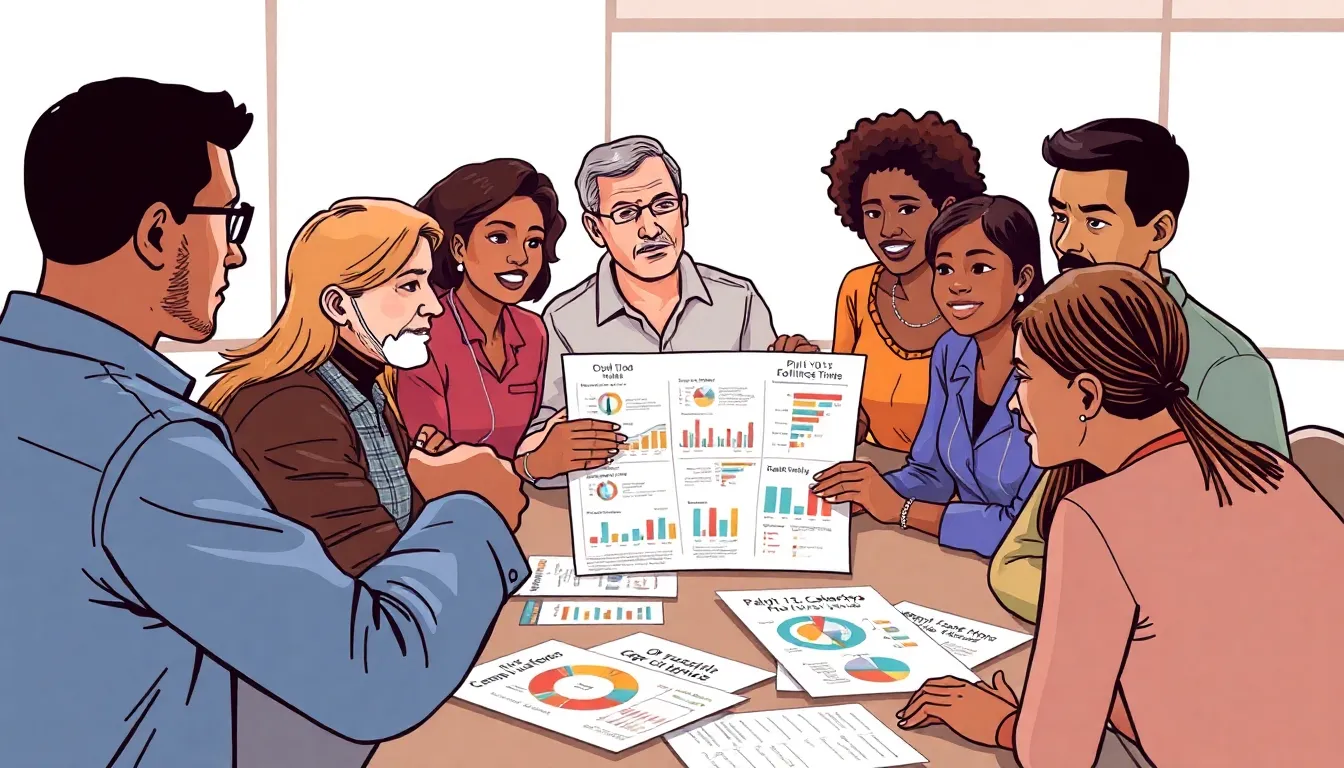Political socialization might sound like a fancy term reserved for academia, but it’s really just the way individuals learn about politics and develop their beliefs. From the dinner table debates to those late-night talk show rants, our political views are shaped by a mix of family, friends, media, and life experiences. It’s like a never-ending game of telephone, where each person adds their own twist to the message.
Table of Contents
ToggleUnderstanding Political Socialization
Political socialization refers to the process by which individuals acquire political beliefs and values. It shapes individuals’ perspectives on political issues and influences their engagement within a community.
Definition of Political Socialization
Political socialization encompasses the methods individuals use to develop their political beliefs. Family, peers, educational institutions, and media play key roles in this development. These influences occur throughout life, beginning in childhood and evolving into adulthood. The process involves communication, observation, and personal experiences that affect one’s understanding of politics. Individuals internalize information from diverse sources, such as news outlets or social media platforms, which helps frame their political views.
Importance of Political Socialization
Political socialization is essential for understanding democratic participation. It predicts voting behaviors and civic engagement levels among citizens. By learning political values, individuals foster a sense of identity and belonging within a society. This process also promotes informed decision-making, allowing citizens to engage in discussions and debates. Political socialization influences public opinion, with cumulative experiences shaping group sentiments. Furthermore, the interaction of various socialization agents cultivates diversity in political thought, enriching discourse within a community.
Factors Influencing Political Socialization

Political socialization occurs through various influences that shape individual political beliefs and attitudes.
Family Influence
Family serves as the first and most significant agent of political socialization. Children absorb political values from parental discussions, socialization practices, and observed behaviors. Families often instill party loyalty, which can persist into adulthood. Conversations about political events at home foster an understanding of civic responsibilities. Moreover, diverse family backgrounds contribute to varied political perspectives, enriching the overall political landscape.
Education and Schools
Education plays a vital role in shaping political beliefs. Schools introduce students to civic knowledge and democratic principles. Curriculums often emphasize critical thinking, enabling students to analyze political issues. Teachers also influence students’ political views through their discussions and values. Extracurricular activities, such as debate clubs and student government, encourage active participation and engagement in political processes. Educational institutions, therefore, lay the groundwork for informed citizenship.
Peer Groups and Social Networks
Peer groups significantly affect political socialization during adolescence and adulthood. Friends and social networks provide a platform for sharing opinions and debating political views. Group discussions can either reinforce or challenge individual beliefs. Collective experiences, such as protests or advocacy programs, create a sense of belonging and shared identity. Online social networks further amplify this influence by exposing individuals to diverse ideologies and fostering engagement in political discourse.
Media and Communication
Media serves as a powerful agent of political socialization in modern society. Traditional media, such as newspapers and television, present political information and shape public perceptions. Social media platforms allow individuals to engage with political content actively, influencing attitudes and beliefs. News consumption patterns determine the topics individuals prioritize in political discussions. Additionally, media coverage can frame political narratives, affecting perceptions of candidates and policies. The significant impact of media underscores its role in shaping political awareness.
The Process of Political Socialization
Political socialization occurs through various stages over an individual’s life. These stages consist of childhood, adolescence, and adulthood. In childhood, families impart basic political beliefs and values. As adolescents, individuals often explore political ideas through education and peer interactions. Finally, in adulthood, experiences in the workplace and community further refine political perspectives.
Stages of Political Socialization
Childhood marks the initial stage of political socialization. During this period, children absorb political beliefs from their parents. Adolescence introduces a broader context as schools teach civic knowledge and social awareness. Further discussion with peers leads to the exploration of diverse viewpoints. In adulthood, personal experiences solidify these beliefs, as individuals engage actively in civic life and political communities.
Agents of Political Socialization
Families serve as the primary agents of political socialization. Through discussions, children gain early insights into political values. Schools represent another critical agent, providing structured civic education. Peers also play a significant role, offering platforms for debate and discussion. Additionally, media exposure shapes public opinion, influencing beliefs and attitudes toward politics. Each of these agents contributes uniquely to the shaping of political identity.
Impact of Political Socialization on Society
Political socialization significantly influences how individuals engage with their communities and understand political systems. Its effects are evident in various aspects of civic engagement and belief formation.
Civic Engagement and Participation
Civic engagement stems from the political socialization process. Individuals with strong socialization experiences often participate in community activities, including voting and volunteering. Engaged citizens express interest in local and national issues, motivated by their learned values and beliefs. Studies show that active participation enhances democratic processes, encouraging informed decision-making among the electorate. Furthermore, diverse political backgrounds foster vibrant discussions that lead to community growth. For instance, local organizations thrive when citizens share different perspectives and collaborate on solutions to common issues.
Formation of Political Beliefs and Attitudes
Political beliefs and attitudes evolve through various socialization influences. Individuals absorb ideas from family discussions and peer interactions, shaping their perspectives. Education plays a crucial role, as schools introduce concepts such as civic duty and critical analysis of political information. Research indicates that early exposure to political discourse significantly affects long-term beliefs and attitudes. Additionally, media serves as a powerful agent, providing information that influences perceptions of political figures and policies. Ultimately, the amalgamation of these factors creates a unique political identity, shaping how individuals view their roles within society.
Political socialization plays a crucial role in shaping individual beliefs and values about politics. This ongoing process influences how people engage with their communities and participate in civic life. As individuals navigate through various stages of life their political identities evolve through interactions with family peers education and media.
Understanding the dynamics of political socialization not only highlights the importance of informed decision-making but also fosters a diverse political discourse. By recognizing the influences that shape political views society can promote greater civic engagement and encourage active participation in democratic processes. Ultimately political socialization serves as the foundation for a vibrant and informed citizenry.


